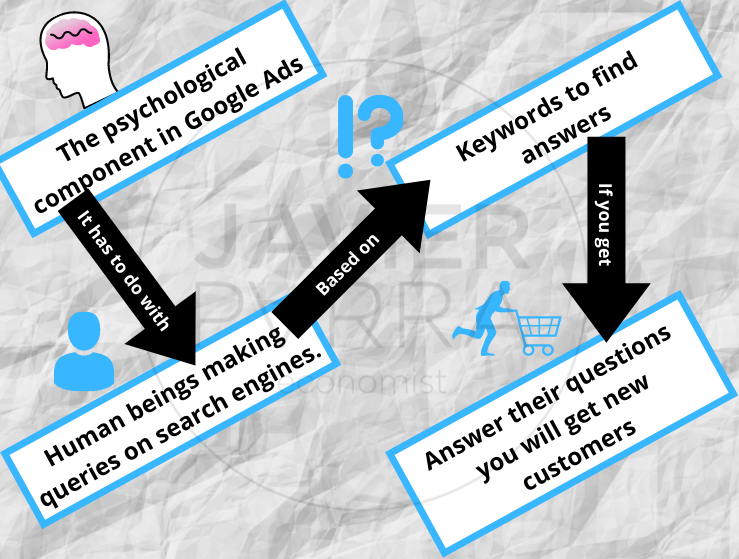When it comes to an understanding the psychological component in Google Ads, it is necessary to understand the advantages of online advertising, since all the data about it is clear and transparent for the advertiser, making it easy to track indicators such as click and conversion rates, the price of the conversion (i.e. the cost for each click that the customer makes on the link), the number of conversions, or the bounce rate, among many other data.
While it is true that so much information and so many numbers and graphs can be overwhelming, understanding it will bring us one step closer to understanding the psychological component of Google Ads. Thanks to a few simple formulas in excel and with the help of your favourite analysis program, you can obtain a lot of information that can be of great value for your business or company.
It is therefore vital that we understand that the information provided by Google Ads are not just numbers but users (even if they are unknown to us), i.e. people, who sit on the other side of the screen to search on the Internet and that these numerical indicators that we observe are the proof or failure of our marketing on the network and that such success depends on the REAL but ANONYMOUS users of the network.
How to use the psychological component in Google Ads in favour of your business?
In general, search engine marketing, especially Google Ads, usually starts from the assumption that consumers use the services and/or products that are most visited (those on the pages that receive the most clicks). Therefore those are the ads that will be shown the most because they assume that they respond best to the customers’ needs. Looking at it this way, it is not unreasonable to stop and think about how people search for your product and/or service in their day-to-day lives.
If you understand how search engines work, you will understand how Google Ads works and why people want to click on the advertising links on the pages in the search results, which will allow you to link your marketing activities to their interests and attract them to the website. But this alone is not enough; the site itself must be attractive and engage the user’s interest so that they don’t just take a look and leave but become your new customer.

To put the psychological component in Google Ads at the service of our company or organisation, it is necessary to concentrate on two important elements:
1- Search engines
One of the most important aspects of the psychological component in Google Ads to consider is the use that users make of search engines and the information they show us. Regardless of which search engine we use (Google Chrome, Bing, Yahoo, Firefox, Safari, etc.), they tend to throw up an enormous amount of information that is scattered all over the web, so much that not even a dozen lifetimes would be enough to study it all.
Add to that that users are only interested in a small part of it, so they do not read all the results that search engines produce but tend to pay attention to the specific information they consider to fit their search. In other words, users use search engines to look for answers to specific questions and will access the pages that they consider to answer those questions.
2- Keywords and search terms
The second element that can help us to use the psychological component in Google Ads in the service of our company or organisation is to understand that we all think in our own personal way; each of us has a particular way of formulating questions. Human beings learn in different ways, so it stands to reason that keywords and search terms will be as varied as people search.
Learning different ways of thinking and asking questions will help you choose keywords that will ensure your ads appear in the eyes of those seeking information by asking questions they can answer on your website.








